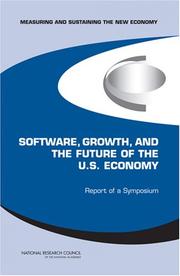| Listing 1 - 10 of 18 | << page >> |
Sort by
|
Book
ISBN: 9780262043229 026204322X 9780262356084 0262356082 Year: 2019 Publisher: Cambridge (Mass.): MIT Press,
Abstract | Keywords | Export | Availability | Bookmark
 Loading...
Loading...Choose an application
- Reference Manager
- EndNote
- RefWorks (Direct export to RefWorks)
Is economic inequality the price we pay for innovation ? The amazing technological advances of the last two decades--in such areas as artificial intelligence, genetics, and materials--have benefited society collectively and rewarded innovators handsomely: we get cool smartphones and technology moguls become billionaires. This contributes to a growing wealth gap; in the United States; the wealth controlled by the top 0.1 percent of households equals that of the bottom ninety percent. Is this the inevitable cost of an innovation-driven economy ? Economist Joshua Gans and policy maker Andrew Leigh make the case that pursuing innovation does not mean giving up on equality--precisely the opposite. In this book, they outline ways that society can become both more entrepreneurial and more egalitarian. All innovation entails uncertainty; there's no way to predict which new technologies will catch on. Therefore, Gans and Leigh argue, rather than betting on the future of particular professions, we should consider policies that embrace uncertainty and protect people from unfavorable outcomes. To this end, they suggest policies that promote both innovation and equality. If we encourage innovation in the right way, our future can look more like the cheerful techno-utopia of Star Trek than the dark techno-dystopia of The Terminator.
Book
ISBN: 1433390477 Year: 2007 Publisher: Huntington Beach : Shell Education,
Abstract | Keywords | Export | Availability | Bookmark
 Loading...
Loading...Choose an application
- Reference Manager
- EndNote
- RefWorks (Direct export to RefWorks)
Government leaders help to govern our country, our states, and our cities. They make important decisions, solve problems, and see that laws are enforced. The people they serve elect most government officials. Long ago, there were not as many government officials as there are today because the United States had a smaller population.
Book
Year: 1996 Publisher: Washington, D.C. : National Academy Press,
Abstract | Keywords | Export | Availability | Bookmark
 Loading...
Loading...Choose an application
- Reference Manager
- EndNote
- RefWorks (Direct export to RefWorks)
Electronic books. -- local. --- High technology industries -- United States. --- Risk -- United States. --- Small business -- United States. --- Technological innovations -- Economic aspects -- United States. --- High technology industries --- Risk --- Small business --- Technological innovations --- Economic aspects

ISBN: 0815766734 Year: 1995 Volume: *8 Publisher: Washington, D.C. Brookings Institution
Abstract | Keywords | Export | Availability | Bookmark
 Loading...
Loading...Choose an application
- Reference Manager
- EndNote
- RefWorks (Direct export to RefWorks)
Technological innovations --- Economic aspects --- United States --- History --- 20th century --- Japan --- Industries --- Economic history --- 1945 --- -Competition [International ] --- Technological innovations - Economic aspects - United States - History - 20th century. --- Technological innovations - Economic aspects - Japan - History - 20th century. --- Industries - United States - History - 20th century. --- Industries - Japan - History - 20th century. --- Economic history - 1945 --- -Competition, International - History - 20th century.

ISBN: 0309082986 9786610209675 1280209674 0309506581 9780309506588 6610209677 9780309082983 030917001X Year: 2002 Publisher: Washington, D.C. : National Academy Press,
Abstract | Keywords | Export | Availability | Bookmark
 Loading...
Loading...Choose an application
- Reference Manager
- EndNote
- RefWorks (Direct export to RefWorks)
Information technology --- Technological innovations --- Technologie de l'information --- Innovations --- Economic aspects --- Congresses --- Aspect économique --- Congrès --- United States --- Etats-Unis --- Economic conditions --- Congresses. --- Conditions économiques --- Aspect économique --- Congrès --- Conditions économiques --- IT (Information technology) --- Technology --- Telematics --- Information superhighway --- Knowledge management --- Information technology - Economic aspects - United States - Congresses --- Technological innovations - Economic aspects - United States - Congresses --- United States - Economic conditions - 1981-2001 - Congresses
Book
ISBN: 0300168993 9786613883773 0300189117 1283571323 9780300189117 9780300168990 9781283571326 6613883778 Year: 2012 Publisher: New Haven : Yale University Press,
Abstract | Keywords | Export | Availability | Bookmark
 Loading...
Loading...Choose an application
- Reference Manager
- EndNote
- RefWorks (Direct export to RefWorks)
"Why America no longer leads the world in innovation, why we should be concerned, and what must be done about it This important book delivers a critical wake-up call: a fierce global race for innovation advantage is under way, and while other nations are making support for technology and innovation a central tenet of their economic strategies and policies, America lacks a robust innovation policy. What does this portend? Robert Atkinson and Stephen Ezell, widely respected economic thinkers, report on profound new forces that are shaping the global economy--forces that favor nations with innovation-based economies and innovation policies. Unless the United States enacts public policies to reflect this reality, Americans face the relatively lower standards of living associated with a noncompetitive national economy. The authors explore how a weak innovation economy not only contributed to the Great Recession but is delaying America's recovery from it and how innovation in the United States compares with that in other developed and developing nations. Atkinson and Ezell then lay out a detailed, pragmatic road map for America to regain its global innovation advantage by 2020, as well as maximize the global supply of innovation and promote sustainable globalization."--Provided by publisher.
Technological innovations --- Diffusion of innovations --- Industrial policy --- Business & Economics --- Economic History --- Economic aspects --- Economic aspects. --- Innovations, Diffusion of --- Acculturation --- Communication --- Culture diffusion --- E-books --- Technological innovations -- Economic aspects -- United States.. --- Technological innovations -- Economic aspects.. --- Diffusion of innovations -- United States.. --- Industrial policy -- United States.

ISBN: 041522652X 0415771218 0203465350 1280317833 0203248643 9780203465356 9780415226523 9780203248645 0429232535 9781134736515 9781134736461 9781134736508 9780415771214 1134736509 Year: 2000 Volume: 3 Publisher: London ; New York : Routledge,
Abstract | Keywords | Export | Availability | Bookmark
 Loading...
Loading...Choose an application
- Reference Manager
- EndNote
- RefWorks (Direct export to RefWorks)
Schumpeter's profoundly influential work developed the notion of the endogeneity of technology, and offered illuminating historical analyses of how and why some social systems have managed to generate innovation. This new interpretation explores Schumpeter's central ideas, and examines the ways in which the concept of endogeneity can illuminate recent American economic history.
Schumpeter, Joseph A. --- Schumpeter, J. A. --- Shumpeter, I. --- Shumpeter, Ĭ. --- Shumpeter, Iosif Aloiz, --- Shumpeter, Ĭozef, --- Shunpētā, --- Evolutionary economics. --- Institutional economics. --- Technological innovations --- Economics --- Economic aspects --- Schumpeter, Joseph Alois, --- Economic production --- Economic schools --- Evolutionary economics --- Institutional economics --- Schumpeter, Joseph A., --- E-books --- Technological innovations - Economic aspects - United States --- Schumpeter, Joseph Alois, - 1883-1950 --- Schumpeter, Joseph --- Schumpeter, Josef --- Schumpeter, J.A. --- シュンペーター, J.A.
Book
ISBN: 0309266432 0309266440 0309266467 Year: 2012 Publisher: Washington, District of Columbia : National Academies Press,
Abstract | Keywords | Export | Availability | Bookmark
 Loading...
Loading...Choose an application
- Reference Manager
- EndNote
- RefWorks (Direct export to RefWorks)
"A committee under the auspices of the Board on Science, Technology, and Economic Policy (STEP), is conducting a study of selected state and regional programs in order to identify best practices with regard to their goals, structures, instruments, modes of operation, synergies across private and public programs, funding mechanisms and levels, and evaluation efforts. The committee is reviewing selected state and regional efforts to capitalize on federal and state investments in areas of critical national needs. Building the Arkansas Innovation Economy: Summary of a Symposium includes both efforts to strengthen existing industries as well as specific new technology focus areas such as nanotechnology, stem cells, and energy in order to better understand program goals, challenges, and accomplishments. As a part of this review, the committee is convening a series of public workshops and symposia involving responsible local, state, and federal officials and other stakeholders. These meetings and symposia will enable an exchange of views, information, experience, and analysis to identify best practice in the range of programs and incentives adopted. Drawing from discussions at these symposia, fact-finding meetings, and commissioned analyses of existing state and regional programs and technology focus areas, the committee will subsequently produce a final report with findings and recommendations focused on lessons, issues, and opportunities for complementary U.S. policies created by these state and regional initiatives. Since 1991, the National Research Council, under the auspices of the Board on Science, Technology, and Economic Policy, has undertaken a program of activities to improve policymakers' understandings of the interconnections of science, technology, and economic policy and their importance for the American economy and its international competitive position. The Board's activities have corresponded with increased policy recognition of the importance of knowledge and technology to economic growth. One important element of STEP's analysis concerns the growth and impact of foreign technology programs.1 U.S. competitors have launched substantial programs to support new technologies, small firm development, and consortia among large and small firms to strengthen national and regional positions in strategic sectors. Some governments overseas have chosen to provide public support to innovation to overcome the market imperfections apparent in their national innovation systems. They believe that the rising costs and risks associated with new potentially high-payoff technologies, and the growing global dispersal of technical expertise, underscore the need for national R&D programs to support new and existing high-technology firms within their borders."--Publisher's description.
Competition -- United States -- Congresses. --- Information society -- United States -- Management -- Congresses. --- Information technology -- Economic aspects -- United States -- Congresses. --- Knowledge management -- United States -- Congresses. --- Technological innovations -- Economic aspects -- United States -- Congresses. --- Technology and state -- United States -- Congresses. --- Information technology --- Technological innovations --- Technology and state --- Knowledge management --- Information society --- Competition --- Economics --- Health Care Economics and Organizations --- Social Sciences --- Health Care --- Anthropology, Education, Sociology and Social Phenomena --- Economic Development --- Engineering & Applied Sciences --- Technology - General --- Economic aspects --- Management

ISBN: 0309099501 9786610567522 128056752X 030965310X 9780309653107 9781280567520 9780309099509 0309180201 Year: 2006 Publisher: Washington, D.C. : National Academies Press,
Abstract | Keywords | Export | Availability | Bookmark
 Loading...
Loading...Choose an application
- Reference Manager
- EndNote
- RefWorks (Direct export to RefWorks)
Computer programs -- Economic aspects -- United States. --- Economic development. --- Technological innovations -- Economic aspects -- United States. --- United States -- Economic conditions -- 21st century. --- Technological innovations --- Computer programs --- Economic development --- Economic History --- Business & Economics --- Economic aspects --- United States --- Economic conditions --- Development, Economic --- Economic growth --- Growth, Economic --- Computer program files --- Files, Computer program --- Program files, Computer --- Programs, Computer --- Economic policy --- Economics --- Statics and dynamics (Social sciences) --- Development economics --- Resource curse --- Computer files --- Computer software --- E-books
Book

ISSN: 14311933 ISBN: 3642415849 3642415857 Year: 2013 Publisher: Berlin, Heidelberg : Springer Berlin Heidelberg : Imprint: Springer,
Abstract | Keywords | Export | Availability | Bookmark
 Loading...
Loading...Choose an application
- Reference Manager
- EndNote
- RefWorks (Direct export to RefWorks)
This book constitutes the proceedings of the First International Conference on Management Science and Engineering: Innovation and High-tech Services, ICMSE 2013, held in Macau, in June 2013. The papers are contributed by innovative researchers, engineers and practitioners in the field of management science, information system, finance, economics and accounting and offer a platform for exchanging the latest research findings in the field of management science and management innovation, for looking forward to the future trends in the management science and management innovation field in the 21st century, and to promote management modernization and high-tech innovation services.
High technology industries -- United States. --- Small business -- United States. --- Technological innovations -- Economic aspects -- United States. --- Business & Economics --- Economic History --- Technological innovations --- Economic aspects --- Business. --- Management. --- Industrial management. --- Finance. --- Business and Management. --- Innovation/Technology Management. --- Finance, general. --- Funding --- Funds --- Economics --- Currency question --- Administration --- Industrial relations --- Organization --- Business administration --- Business enterprises --- Business management --- Corporate management --- Corporations --- Industrial administration --- Management, Industrial --- Rationalization of industry --- Scientific management --- Management --- Business --- Industrial organization
| Listing 1 - 10 of 18 | << page >> |
Sort by
|

 Search
Search Feedback
Feedback About UniCat
About UniCat  Help
Help News
News